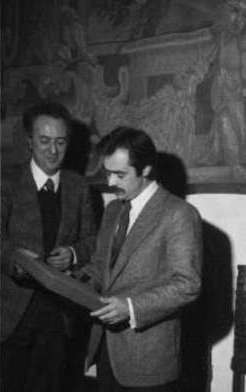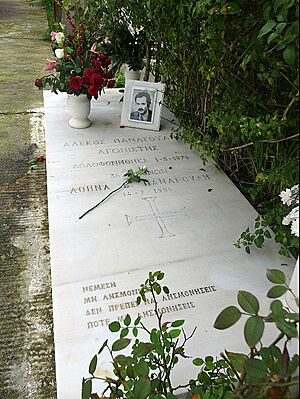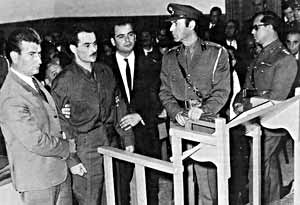Alexandros Panagoulis facts for kids
Quick facts for kids
Alexandros Panagoulis
|
|
|---|---|
| Αλέξανδρος Παναγούλης | |

Panagoulis in Florence (1973), with (to his right) Luigi Tassinari, president of the Province of Florence
|
|
| Member of the Hellenic Parliament for Athens B |
|
| In office 9 December 1974 – 1 May 1976 |
|
| Personal details | |
| Born | 2 July 1939 Glyfada, South Athens, Greece |
| Died | 1 May 1976 (aged 36) Athens, Greece |
| Political party | Centre Union |
| Domestic partner | Oriana Fallaci (1973–1976) |
| Profession | politician, poet |
Alexandros Panagoulis (Greek: Αλέξανδρος Παναγούλης; born July 2, 1939 – died May 1, 1976) was a Greek politician and a poet. He played a big part in fighting against the Regime of the Colonels, a military government that ruled Greece from 1967 to 1974.
Panagoulis became well-known for trying to stop the leader of this government, Georgios Papadopoulos, on August 13, 1968. He also became famous for the harsh treatment he faced while he was held prisoner. After democracy returned to Greece, he was elected to the Greek parliament. He was a member of the Centre Union party.
Contents
Alexandros Panagoulis's Life
Early Life and Family
Alexandros Panagoulis was born in Glyfada, a neighborhood in Athens, Greece. He was the second son of Vassilios Panagoulis, who was an officer in the Greek Army. His mother was Athena.
Alexandros had two brothers: Georgios, who was also an army officer and suffered under the military government, and Efstathios, who later became a politician. Part of Alexandros's childhood was spent on the island of Lefkada during World War II, when Greece was occupied by other countries.
He studied electrical engineering at the National Technical University of Athens.
His Start in Politics
From a young age, Alexandros Panagoulis believed strongly in democratic values. He joined the youth group of the Centre Union party, which was led by Georgios Papandreou. This group later became known as the Hellenic Democratic Youth.
After the military government fell and democracy returned, Panagoulis became the Secretary-General of this youth group on September 3, 1974.
Fighting the Military Government
Alexandros Panagoulis actively fought against the Regime of the Colonels. He left the Greek military because he believed in democracy. He then started an organization called National Resistance.
He went to Cyprus to plan his actions. He returned to Greece and, with help from others, planned to stop Papadopoulos on August 13, 1968, near Varkiza. The attempt failed, and Panagoulis was arrested.
After he was freed, Italian journalist Oriana Fallaci quoted Panagoulis saying: I didn’t want to kill a man. I’m not capable of killing a man. I wanted to kill a tyrant. He also said he had no regrets because Papadopoulos "destroyed the legal government - he abolished the liberties of the people."
Trial and Imprisonment
Panagoulis was put on trial by a military court on November 3, 1968. He was sentenced to death on November 17, 1968, along with other members of his group. He was sent to the island of Aegina for the sentence to be carried out.
However, many countries around the world put pressure on the military government. Because of this, they did not execute him. Instead, they put him in Bogiati (Boyati) Military Prison near Athens on November 25, 1968.
Alexandros Panagoulis refused to cooperate with the military government. He was subjected to harsh physical and mental treatment. He managed to escape from prison on June 5, 1969. But he was soon caught again. He was then placed alone in a cell at Bogiati, where he tried to escape several more times without success.
He reportedly turned down offers of freedom from the military government. In August 1973, after four and a half years in jail, he was set free as part of a general pardon given to all political prisoners. This happened during a time when Papadopoulos tried to make his government seem more open. Panagoulis then went to Florence, Italy, to continue his fight against the military government. There, he stayed with Oriana Fallaci, who became his partner and later wrote a book about him.
Return to Democracy
When democracy returned to Greece, Alexandros Panagoulis was elected as a Member of Parliament in November 1974. He was part of the Center Union - New Forces party.
He made claims that some politicians had worked with the military government. He later left his party because of disagreements with its leaders, but he remained in the Greek Parliament as an independent member. He continued to make his claims, even against the Minister of National Defence, Evangelos Averoff. He reportedly received threats to make him stop talking about these claims.
His Death
Panagoulis died on May 1, 1976, at the age of 36. He was killed in a car accident on Vouliagmenis Avenue in Athens. Many people believe his death was not an accident.
A memorial for Panagoulis is located near Oriana Fallaci's tomb at Cimitero degli Allori in Florence.
His Poetry
Alexandros Panagoulis was treated very harshly while he was held by the military government. Many believe he stayed strong because of his determination and his sense of humor. While in Bogiati prison, Panagoulis is said to have written his poems on the walls of his cell or on small pieces of paper. Sometimes, he even used his own blood as ink, as described in his poem "The Paint."
Many of his poems have been lost. However, he managed to get some out to friends while in prison, or he remembered them and wrote them down later. While he was still in prison, his first collection of poems in Italian was published in 1972. It was called Altri seguiranno: poesie e documenti dal carcere di Boyati (Others will Follow: Poetry and Documents of the Prison of Boyati). For this collection, Panagoulis won the Viareggio International Prize of Poetry the next year.
After he was freed, he published his second collection in Milan, Italy. It was titled Vi scrivo da un carcere in Grecia (I write you from a prison in Greece). He had also published several collections in Greek, including The Paint (I Bogia).
Famous Poems
Here are some of his poems:
- Promise
- The teardrops which you will see
- flowing from our eyes
- you should never believe
- signs of despair.
- They are only promise
- promise for Fight.
(Military Prisons of Bogiati, February 1972)
Vi scrivo da un carcere in Grecia, 1974
- My Address
- A match as a pen
- Blood on the floor as ink
- The forgotten gauze cover as paper
- But what should I write?
- I might just manage my address
- This ink is strange; it clots
- I write you from a prison
- in Greece
(Military Prisons of Bogiati, June 5, 1971 – After beating)
Vi scrivo da un carcere in Grecia, 1974.
- The Paint
- I gave life to the walls
- a voice I gave them
- more friendly so that would become my company
- and the guards asked
- to know where they could find the paint
- The walls of the cell
- kept the secret
- and the mercenaries searched everywhere
- but paint they could not find
- Because they did not think for one moment
- that they should search into my veins
Vi scrivo da un carcere in Grecia, 1974
His Legacy
For most Greeks, Alexandros Panagoulis's attempt to stop the leader of the military government made him a symbol of freedom, democracy, and human rights. He is seen as a hero of democracy because of his strong moral beliefs.
Greece honored him with a postage stamp in 1996 and a prepaid telephone card in the same year. Over the years, more recognition has come. By 2008, 22 streets in Athens and its suburbs were named after him. A metro station in Athens (Agios Dimitrios), which is close to where he died, was also renamed to include his name.
In Art and Media
Alexandros Panagoulis's life and work have inspired many artists.
The famous composer Mikis Theodorakis, who was also persecuted by the military government, set some of Panagoulis's poems to music. Panagoulis also worked with composer Ennio Morricone on a 1974 album called Non Devi Dimenticare. This album featured Panagoulis's poetry, and he even narrated parts of it.
Panagoulis was the subject of Panagulis Vive (Panagoulis Lives), a 1980 Italian TV mini-series. He also appeared in a 1973 documentary called Altri Seguiranno (Others will follow). German filmmakers also made documentaries about him, including "Eine Rose ist eine Rose ist eine Rose. Ein Mord ist ein Mord ist ein Mord." and Der Fall Panagoulis.
His story was also studied by many researchers. One important result was the book Un Uomo (A Man) by Oriana Fallaci. In 2024, a book called ORIANA: A Novel of Oriana Fallaci was published, which is based on the true story of Fallaci and Panagoulis's relationship.
See Also
- Amalia Fleming
Images for kids




